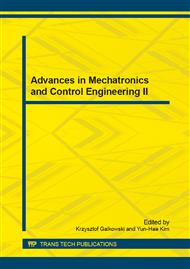[1]
W Burgard, M Moors, D Fox, et al. Collaborative multi-robot exploration. Robotics and Automation (ICRA), 2000 IEEE International Conference on, Vol. 1(2000), pp.476-481.
DOI: 10.1109/robot.2000.844100
Google Scholar
[2]
D. Puig, MA. García and L. Wu: Robotics and Autonomous Systems. Vol. 59 (2011), pp.635-653.
Google Scholar
[3]
D Holz, N Basilico, F Amigoni, et al. Evaluating the efficiency of frontier-based exploration strategies. In Proceedings of Joint 41st International Symposium on Robotics and 6th German Conference on Robotics. (2010).
Google Scholar
[4]
P Senarathne, D Wang. A two-level approach for multi-robot coordinated exploration of unstructured environments. In Proceedings of the 27th Annual ACM Symposium on Applied Computing. ACM, 2012, pp.274-279.
DOI: 10.1145/2245276.2245331
Google Scholar
[5]
B Yamauchi. Frontier-Based Exploration Using Multiple Robots. In Proceedings of the Second International Conference on Autonomous Agents. 1998, pp.47-53.
DOI: 10.1145/280765.280773
Google Scholar
[6]
W Burgard, M Moors and C Stachniss et al.: Robotics, IEEE Transactions on. Vol. 21 (2005), pp.376-386.
Google Scholar
[7]
R Zlot, A Stentz, MB Dias, et al. Multi-robot exploration controlled by a market economy. Robotics and Automation (ICRA), 2002 IEEE International Conference on, Vol. 3 (2002), pp.3016-3023.
DOI: 10.1109/robot.2002.1013690
Google Scholar
[8]
L. Wu, MA. García and D. Puig et al.: Journal of Physical Agents. Vol. 1 (2007).
Google Scholar
[9]
KM Wurm, C Stachniss and W Burgard. Coordinated multi-robot exploration using a segmentation of the environment. Intelligent Robots and Systems (IROS), 2008 IEEE/RSJ International Conference on, 2008, pp.1160-1165.
DOI: 10.1109/iros.2008.4650734
Google Scholar
[10]
A Solanas, MA Garcia. Coordinated multi-robot exploration through unsupervised clustering of unknown space. IEEE/RSJ International Conference on Vol. 1(2004), pp.717-721.
DOI: 10.1109/iros.2004.1389437
Google Scholar
[11]
G. Grisetti, C. Stachniss and W. Burgard: Robotics, IEEE Transactions on. Vol. 23 (2007), pp.34-46.
Google Scholar
[12]
K.D. Wise, A. Bowyer: The International Journal of Robotics Research. Vol. 19 (2000), pp.762-779.
Google Scholar
[13]
R Simmons, D Apfelbaum and W Burgard, et al. AAAI/IAAI. 2000, pp.852-858.
Google Scholar
[14]
O. Khatib: Coordination for multi-robot exploration and mapping. The international journal of robotics research. Vol. 5 (1986), pp.90-98.
Google Scholar
[15]
M Quigley, K Conley and B Gerkey, et al. ROS: an open-source Robot Operating System. ICRA workshop on open source software Vol. 3(2009).
Google Scholar
[16]
R. Vaughan: Swarm Intelligence. Vol. 2 (2008), pp.189-208.
Google Scholar


